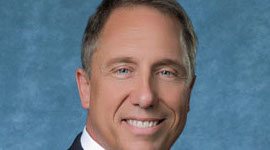New VP Adding Value to Healthcare Team
Tuesday, January 12, 2016
WDI Vice President of the Healthcare Research Initiative David Butz took a unique and winding path to WDI.

Butz, who cut his teeth studying industrial organizations as a graduate student and while on the faculty at UCLA, where he taught economics for eight years, was not always interested in healthcare. A few years after joining the faculty at U-M’s Ross School of Business in 1994, he had a brief talk with a student after class that changed that forever.
The student, U-M Health System (UMHS) surgeon and assistant professor Paul Taheri, told Butz that he had access to the UMHS data warehouse. The warehouse contained all the costs to run a hospital – from training a surgeon to the cost difference between treating an aortic aneurysm with a stent or open-heart surgery.
“For somebody like me to get the level of detail that they have in the data warehouse was intoxicating,” Butz said with a smile. “Right there I turned to healthcare and never looked back.”
The applied research Butz and Taheri did relied heavily on the UMHS data warehouse, and led to peer-reviewed publications, collaboration on internal consulting projects, and workshops for businesspeople and medical residents alike.
Butz, who joined WDI as a part-time independent contractor in May 2015, became the full-time vice president of healthcare research in November. He leads a talented, knowledgeable and experienced WDI healthcare team that works with partners to improve the global supply markets for lifesaving drugs to prevent shortages, strengthen supply chain systems to quickly and efficiently get the medicines where they are needed, and develop business models for better healthcare service delivery to patients.
WDI President Paul Clyde said Butz’s mix of expertise in areas important to the Institute and the type of work he has done made him the best person to lead the initiative.
“He has published on issues related to industrial organization, which is the foundation for market dynamics, and on supply chain, the other major area of focus for the healthcare initiative,” Clyde said. “He also had extensive experience in healthcare both as a researcher and as someone who works with governments and firms in implementing solutions – a combination that matches our role both as a think tank and as an institute that implements the work in the field.”
Butz said because of WDI’s small size, the healthcare initiative has to select a few areas where it can be effective. One area is supply chain – using best practices to ensure the availability and affordability of high-quality healthcare products in both the private sector and the public sector.
“Supply chain may be the single biggest bottleneck in improving healthcare in low- and middle-income countries,” he said. “So that seems a pretty straightforward area to be in, and we’ve had considerable success there so far.”
He said market dynamics – researching global drug markets on things such as demand forecasts, production capabilities, suppliers, and procurement mechanisms so policymakers are better informed – is another area of healthcare focus for WDI. It is a relatively new field of research and therefore a place “where we can have a real impact intellectually and practically in how people think about the shaping of those institutions.
“We are uniquely situated to have a good voice because the way the Institute is set up,” Butz said. “We are not an NGO, we are not a pure academic setting. Our interests are practical, and at the same time very market oriented in ways that traditional NGOs and donor organizations may not be.”
Since 2001, Butz has taught a “business of health care” boot camp elective through the Ross School to graduate students university-wide. He also has delivered one- and two-day versions of this course in workshops and conferences to scores of corporate clients, government agencies, professional societies, physician group practices, and others.
That same year, Butz began a long relationship with GE Healthcare’s (GEHC) Performance Solutions consultancy, working on-site in emergency departments, trauma centers, maternal-infant care, stroke, and other inpatient and outpatient domains. He traveled in the U.S. and to Europe, the Middle East, Africa, and Asia for GEHC.
Butz said it wasn’t until he spent a couple of weeks visiting hospitals and clinics in Uganda in 2010 with Paul Clyde, then a Ross faculty member who has led several healthcare student MBA projects and travel-study courses, that he became “obsessed with global healthcare, and was hoping I could find a way back into it.”
He has found that at WDI, and is excited and hopeful about the future.
“I would not have come here if I didn’t think we could have some level of impact,” Butz said. “It’s going to be a challenge, but I’m optimistic about the world and what this Institute does and where we fit into that.”
